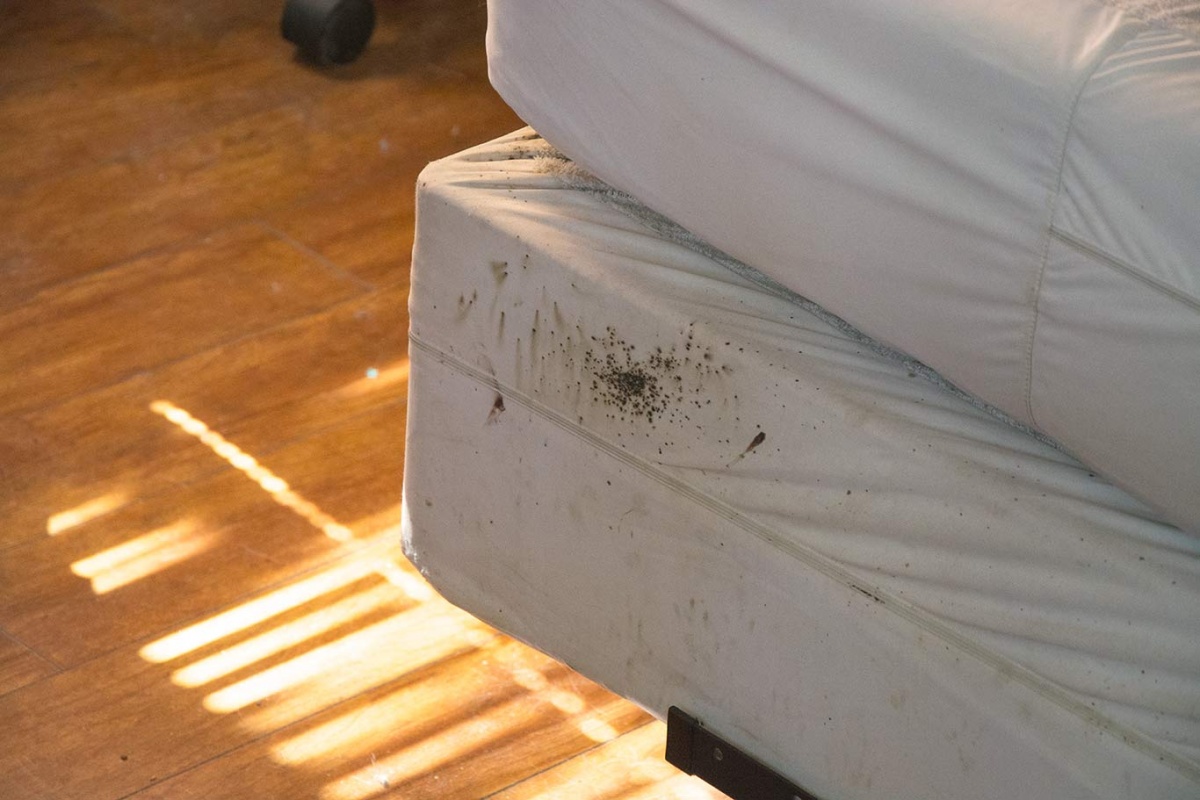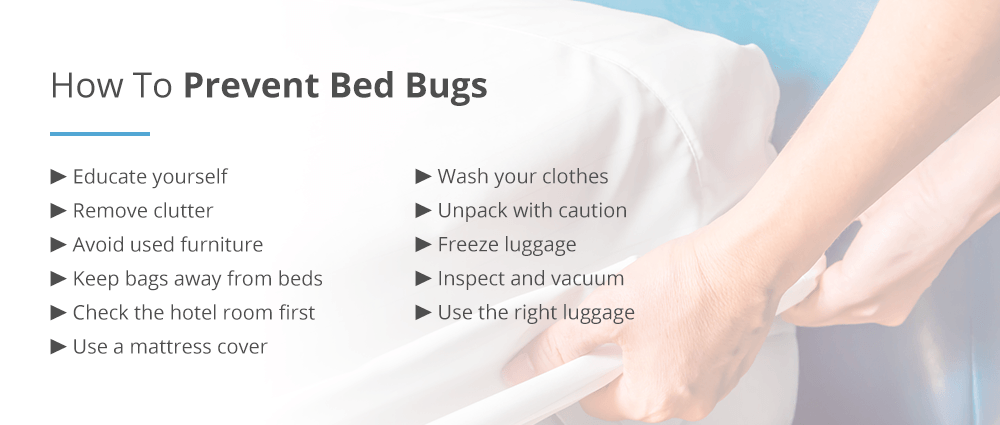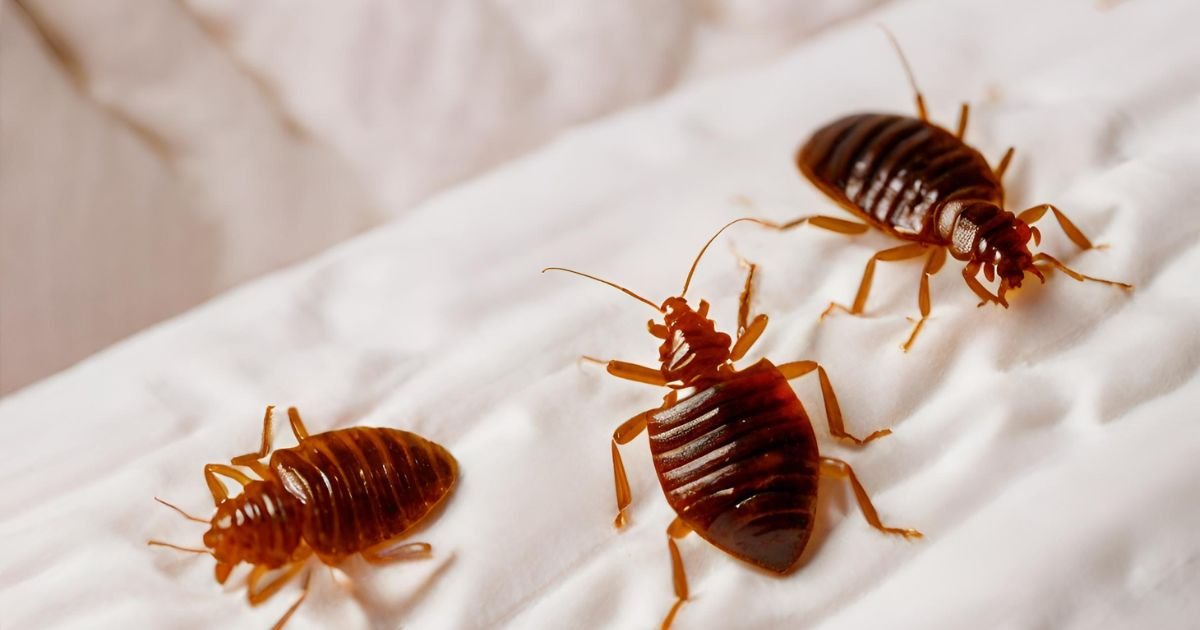To prevent bugs on your bed, regularly wash your bedding in hot water and vacuum your mattress. Additionally, use a mattress encasement to protect against bugs and regularly inspect your bed for any signs of infestation.
Avoid clutter around the bed and keep the area clean to discourage bugs from taking up residence. Having bugs on your bed can be a major nuisance and can also impact your sleep and health. Therefore, it’s crucial to take proactive steps to prevent bugs from infesting your bed.
By following some simple tips and incorporating preventive measures into your routine, you can ensure a bug-free sleeping environment. We will explore effective strategies to keep bugs away from your bed, allowing you to rest peacefully and maintain a hygienic sleeping space. Understanding the importance of bug prevention and implementing these strategies can significantly improve your overall sleeping experience.

Credit: www.catseyepest.com
Understanding Bed Bugs
Bed bugs are small insects that feed on human blood. They are reddish-brown in color and can be challenging to detect due to their small size and secretive behavior.
Appearance And Behavior
- Bed bugs are oval-shaped and flat, about the size of an apple seed.
- They are wingless insects with a reddish-brown color and become darker after feeding.
- Bed bugs are mainly active at night and hide in cracks and crevices during the day.
Common Infestation Areas
- Bed bugs are commonly found in bedding, mattresses, and bed frames.
- They can also hide in furniture, floorboards, and electrical outlets.
- Bed bugs are known to travel through wall voids and can quickly infest an entire room.
Preventing bed bug infestations requires vigilance and thorough inspection of potential hiding spots. Regular cleaning and maintenance of living areas can help in identifying and addressing any signs of bed bugs early on.
Signs Of Bed Bug Infestation
Discovering signs of bed bug infestation early is crucial to prevent a full-blown intrusion.
Bite Marks
Identify bed bug infestation by spotting bite marks on your skin upon waking up.
Blood Stains
Blood stains on your bed sheets can indicate the presence of bed bugs.
Dark Spots On Bedding
Watch out for dark spots on your bedding, a telltale sign of bed bug activity.
Preventive Measures
To prevent bugs on your bed, regularly wash bedding in hot water, vacuum and clean the mattress frequently, use bed bug-proof covers, and avoid bringing in used furniture. Implementing these preventive measures can help keep bugs away from your sleeping area.
Preventing bugs on your bed is essential for a restful and healthy sleep. Implementing preventive measures can help keep those pesky bugs away and ensure your peace of mind. So, let’s dive into the effective steps you can take to prevent bugs on your bed.
Regular Cleaning And Decluttering
Regular cleaning and decluttering plays a vital role in keeping bugs away from your bed. Dust, debris, and clutter provide a perfect breeding ground for bugs to thrive. Here are a few cleaning tips:
- Keep your bedroom clean and organized by removing any unnecessary items that can collect dust or hide bugs.
- Vacuum the floors and carpets frequently to eliminate any eggs, bugs, or debris that may have found their way into your bedroom.
- Dust the furniture, including the bed frame, headboard, and nightstands, using a damp cloth to ensure you remove any potential bug hiding spots.
Vacuuming
Vacuuming is an effective measure to prevent bugs from making a home on your bed. Follow these tips for successful bug elimination:
- Vacuum your mattress, paying close attention to the seams, crevices, and corners where bugs may hide.
- Use a high-powered vacuum cleaner with a HEPA filter to capture even the tiniest bug particles.
- After vacuuming, carefully dispose of the vacuum bag or empty the canister outside to ensure the bugs do not find their way back into your bedroom.
Washing Beddings
Regularly washing your beddings is crucial for bug prevention. Here’s what you need to do:
- Wash your sheets, pillowcases, and blankets in hot water to kill any bugs and their eggs.
- Use a mild detergent and consider adding a few drops of lavender or tea tree oil, as both have bug-repelling properties.
- Dry your beddings on high heat to ensure any remaining bugs or eggs are eliminated.
Using Mattress And Pillow Encasements
Mattress and pillow encasements act as protective barriers, preventing bugs from infesting your bed. Consider the following:
- Invest in quality mattress and pillow encasements that are specifically designed to keep bugs out.
- Ensure the encasements are made of a durable and tear-resistant material to effectively trap and eliminate any bugs that may be present.
- Regularly inspect the encasements for any signs of damage and replace them if necessary.
By following these preventive measures, you can safeguard your bed from pesky bugs and enjoy a peaceful sleep every night. Remember, a clean and bug-free bed is essential for your overall well-being.

Credit: pestech.com
Natural Remedies
Natural remedies are an effective and non-toxic way to prevent bugs from infesting your bed. By harnessing the power of essential oils and diatomaceous earth, you can create a bug-repellent barrier that keeps your sleeping space bug-free. Here are the top natural remedies that can help you achieve a bug-free bed.
Lavender Oil
Lavender oil is a natural insecticide and insect repellent that can effectively deter bed bugs. The strong and pleasant aroma of lavender repels bugs and can also help you relax at bedtime. To use lavender oil, mix a few drops with water and spray it around your bed and on your mattress.
Tea Tree Oil
Tea tree oil is known for its powerful antifungal and antibacterial properties, but it can also be effective in repelling bed bugs. Mix a few drops of tea tree oil with water and spray it on your mattress, bed frame, and surrounding areas to keep bugs at bay.
Diatomaceous Earth
Diatomaceous earth is a natural sedimentary rock that contains fossilized remains of diatoms. It works by absorbing the waxy outer layer of insects, causing them to dehydrate and die. Sprinkle a thin layer of food-grade diatomaceous earth around your bed and in cracks and crevices to create a barrier that kills and repels bed bugs.
Professional Treatment Options
To effectively eliminate and prevent bed bugs, it may be necessary to seek professional treatment options. These methods are typically more reliable and comprehensive, ensuring that bed bugs are eliminated from the environment and do not return.
Pest Control Services
Professional pest control services are a widely used method for bed bug eradication. Exterminators are equipped with specialized knowledge and products to eradicate bed bugs from residential and commercial spaces.
Heat Treatment
Heat treatment involves raising the temperature in the infested area to a level that is lethal to bed bugs. This method effectively eliminates bed bugs at all stages of their life cycle, including eggs and nymphs, without the use of harmful chemicals.
Travel Tips
Inspecting Hotel Rooms
When you arrive at your hotel, take a few minutes to inspect the room for any signs of bed bugs. Start by pulling back the sheets and inspecting the mattress seams and corners for small brownish or reddish bugs, dark spots, or small black dots, which could be bed bug feces. Look for any shed skins or tiny eggs as well. Pay close attention to the headboard, nightstands, and any upholstered furniture in the room.
Using Luggage Racks
To protect your luggage from bed bugs while traveling, make sure to use the luggage rack provided in your hotel room. Avoid placing your luggage on the bed or the floor, as these are common areas where bed bugs can hide. Instead, place your bags on the luggage rack, as bed bugs are less likely to be found on elevated surfaces. Additionally, consider keeping your suitcase closed when not in use and utilizing zippered bags or packing cubes to further prevent any bugs from getting inside.
Laundry Precautions
Taking certain precautions with your laundry can also help prevent bringing bed bugs home with you. When returning from your trip, place all your clothing directly into a laundry bag, ideally a plastic one. This will help contain any potential bed bugs and prevent them from spreading throughout your home. When doing laundry, wash your clothes in hot water, preferably above 60°C (140°F), as bed bugs cannot survive in temperatures that high. Upon finishing, tumble dry everything on high heat for at least 30 minutes to ensure any remaining bugs or eggs are eliminated.

Credit: www.wikihow.life
Frequently Asked Questions For How To Prevent Bugs On Bed?
How Can I Prevent Bed Bugs From Infesting My Home?
To prevent bed bugs, regularly inspect your mattress and upholstery, minimize clutter, vacuum frequently, wash and dry your bedding on high heat, and use protective mattress covers. When traveling, inspect hotel rooms for signs of bed bugs and keep your luggage off the floor.
What Are The Signs Of A Bed Bug Infestation?
Signs of bed bugs include tiny reddish-brown insects on bedding, mattress seams, and furniture, as well as small red bites on the skin. Additionally, look for dark spots or blood smears on bedding, which may indicate bed bug activity.
Can I Use Natural Remedies To Deter Bed Bugs?
Natural remedies such as essential oils, diatomaceous earth, and tea tree oil may help repel bed bugs. However, these methods are not always effective in eradicating an existing infestation and should be used in conjunction with professional pest control methods.
Are Professional Pest Control Services Necessary For Bed Bug Prevention?
Professional pest control services can provide thorough inspections, targeted treatments, and ongoing monitoring to effectively prevent and control bed bug infestations. When dealing with a severe infestation, it’s advisable to seek the expertise of pest control professionals.
Conclusion
Following these guidelines can help you prevent bugs from infesting your bed. By regularly cleaning your bedding, vacuuming the mattress, using mattress encasements, and implementing preventive measures like sealing cracks and crevices, you can create an unfavorable environment for bugs.
Remember to inspect and treat any infestation promptly to minimize the risk of further problems. With these steps, you can enjoy a bug-free and peaceful sleep every night.
Related posts:

I’m MD Tanvir, and I bring years of expertise gained from working closely with pest control companies to the forefront. My journey in the industry has inspired me to launch Bug Battler, a platform aimed at equipping people with the know-how to combat pests autonomously. Through Bug Battler, I aim to empower individuals with practical insights to tackle pest infestations effectively.

